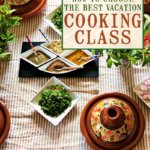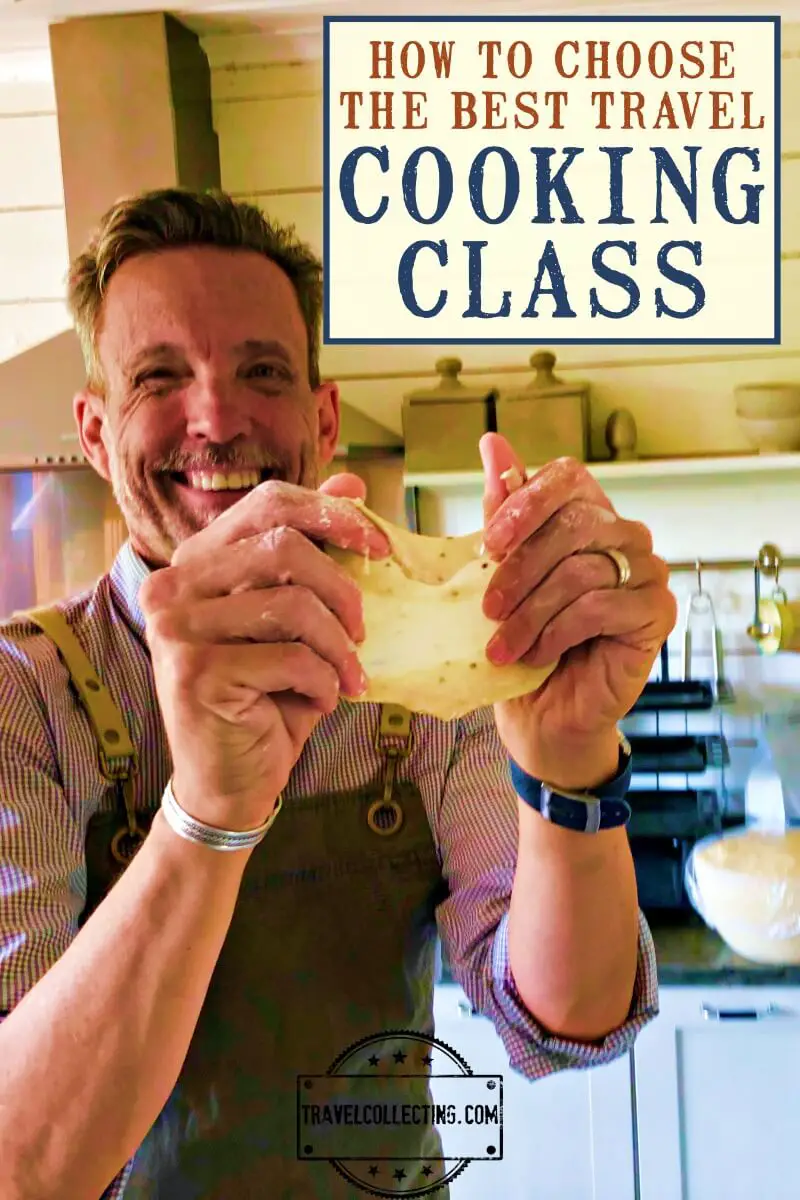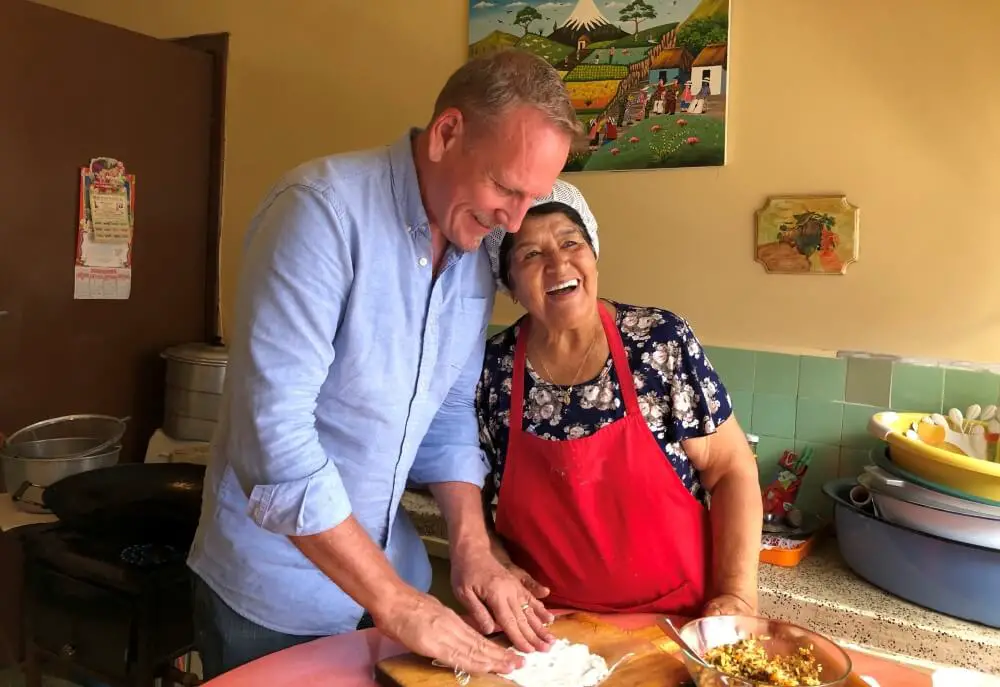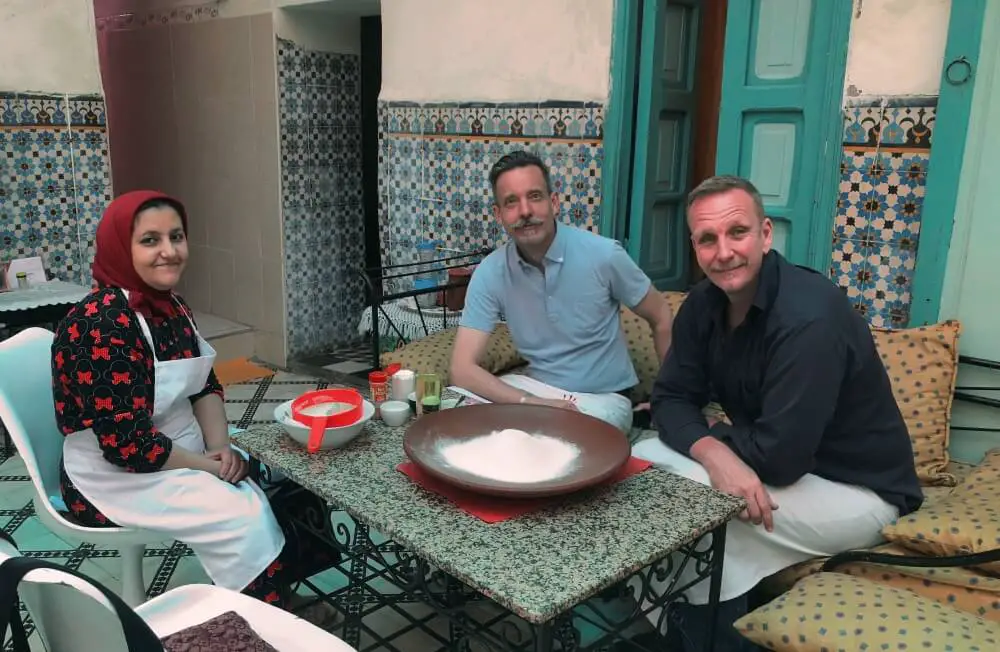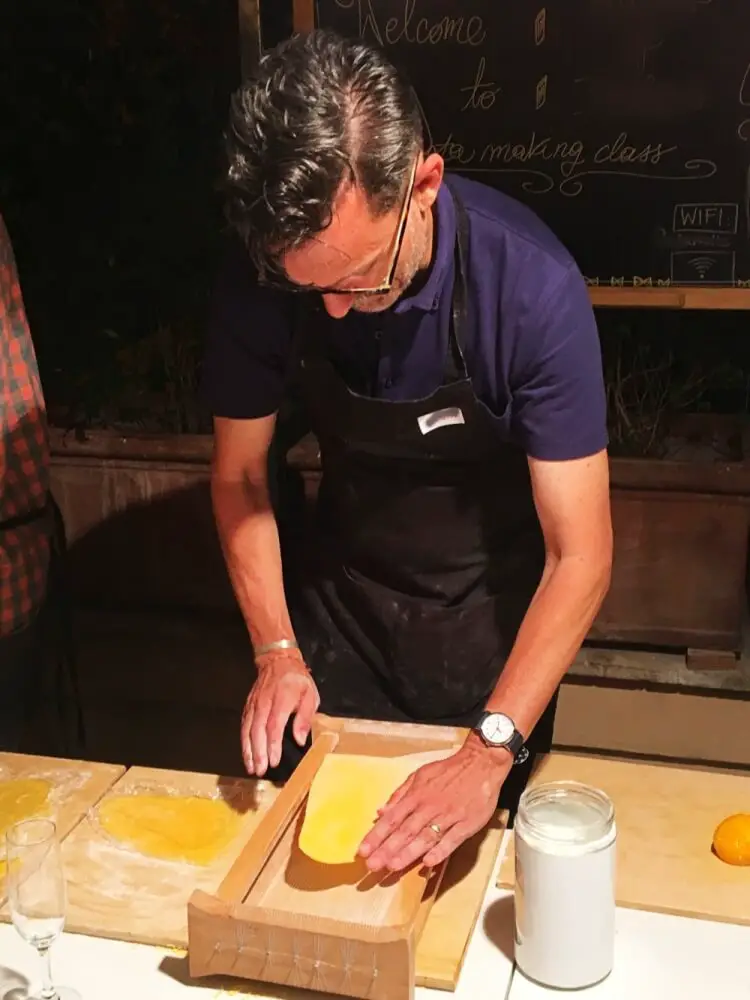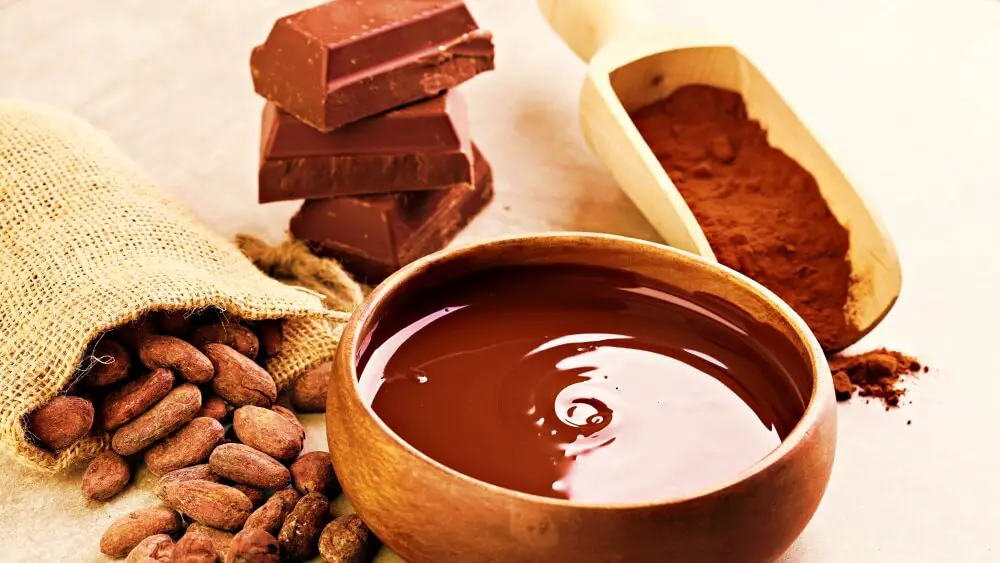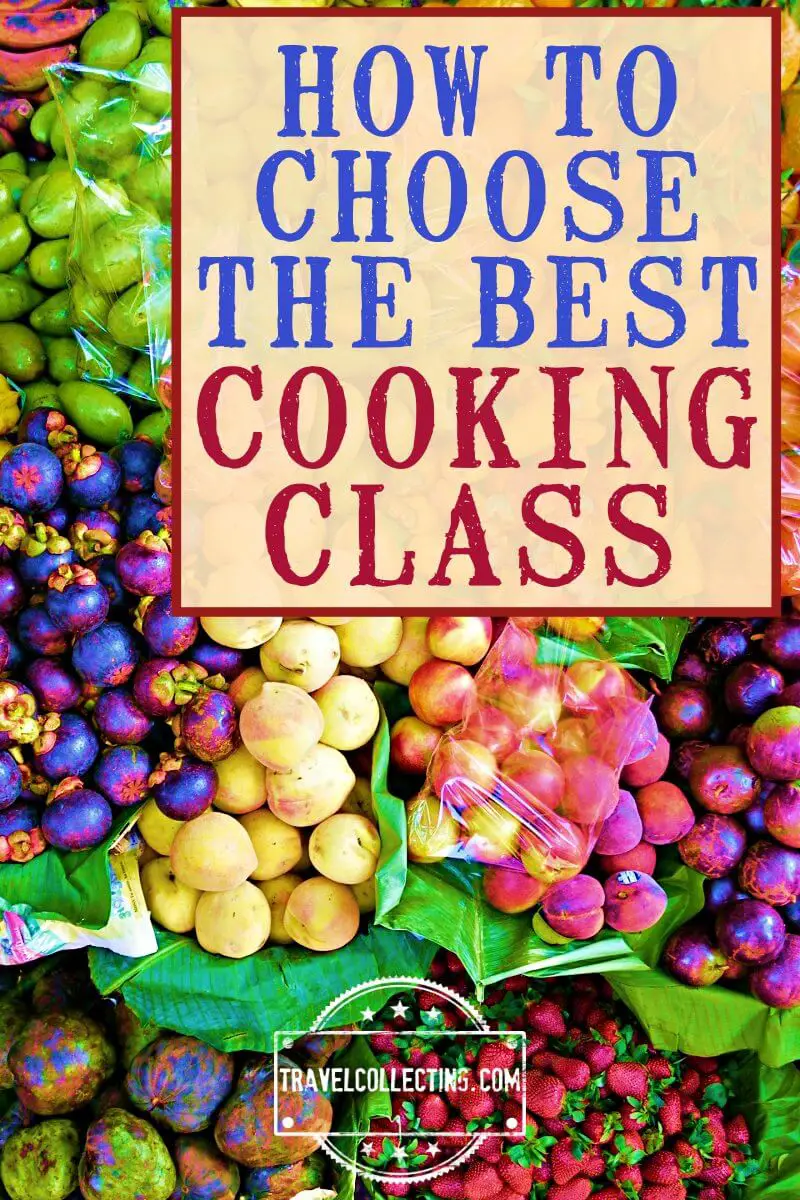I have taken many cooking classes on my travels. Food is such an important part of the local culture that I love to eat as much as I can of the local food.
However, learning how to make local dishes gives an insight into the food and how it is prepared that trying something in a restaurant just can’t. It is also a great way to meet local people – often women – who, in some cultures, it is difficult for a man to talk with.
Some of the cooking classes I’ve taken have definitely been better than others, however. There are several things to consider in order to choose the perfect travel cooking class.
Please note this post may contain affiliate links, which means we may receive a commission, at zero cost to you, if you make a purchase through a link. Please see our full Disclosure for more information. If you have any questions, please let me know.
How to find the perfect travel cooking class
Before you can compare cooking classes to find the best one, you need to know where to find them. I find my cooking classes on Viator and Get Your Guide. They have a great selection of classes, as most providers of classes list their classes on these websites.
I hear some people express concern that booking through these websites means they will pay more. This is not the case, though. It’s the same as when you book through a travel agent – the provider pays a small commission and you pay nothing more.
If you want to take a cooking class for your next vacation search on Viator and Get Your Guide to find ones available for your destination.
Things to consider to choose the best cooking class
There are several things to consider when deciding which cooking class to take.
1. Why are you taking the cooking class or course?
As with almost everything in life that you do, the first thing to think about is why. I take cooking classes when I travel because I want to connect with the culture and meet local people. Actually learning to cook something that I will cook again back home is secondary for me.
However, for you, it may be the most important thing. This will affect who you want you teacher to be, and where the class should take place.
2. Who is the teacher?
Some classes are taught by women who are not professional cooks, but have started offering classes as a way to make some extra money. Other classes are taught by professional chefs. Others may be taught by certified cooking teachers, especially if you are taking a whole course. They offer different levels of professionalism, and if you really want to learn cooking techniques, having a professional teacher would most likely be best.
This does not mean that a home cook will be unprofessional though. I have had many really great classes taught by home cooks. They may not always speak English, however.
2. Is there a translator?
It’s worth checking in advance that the class will be in English. Even if it is, it does not always mean that the teacher will speak English. Often the place will supply a translator, with the cook speaking just a few random words of English, usually for ingredients.
This isn’t necessarily a bad thing, as it usually means that you are getting an expert local cook (who may be a home cook). It does mean that your communications will mostly be with the translator, so if you are using this as an opportunity to connect with a local, the local will be the translator, not the cook. They will have different perspectives, but may also share the cook’s opinions, if you ask. None of this is bad – just something to consider.
3. Where is the cooking class?
The most common places are in a restaurant or in someone’s home. Cooking schools or even a hotel or B and B kitchen are other options. Each of these provides a different experience.
If your cooking class is in a restaurant or coking school, you will have access to a professional kitchen. However, classes held in someone’s home mean that you get to see what a local home looks like.
4. How many are in the group?
The smaller the group, the better. With fewer people, the cook is able to give you more individual attention and you will also usually get more chance to do more. With very large groups, and only so much food to prepare, your participation can be more limited.
5. What is the level of participation?
This is very important to discover before booking the class. I want to be involved and be doing most of the cooking. However, some cooking classes are mostly demonstrations, or one person in the group does something while everyone else watches. Other classes involve lots of chopping of vegetables, but then the actual cooking is done by the instructor or by one person in the group. I always like to make sure that I will have a chance to do a lot of the actual cooking.
Subscribe to regular updates with tips for planning, travel inspiration and trip ideas and get instant access to the free PDF of this
Checklist for Finding the Perfect Cooking Class
6. Do you go to the market?
This is pretty common, depending on where the class is. If you are in a place where fruit, vegetables and other produce is bought in a local market, then having a chance to go to the market and buy everything fresh is a great addition to the cooking class experience. It also beats wandering around the market with no real reason to be there other than to see it and maybe take photos.
7. What do you cook?
Obviously, you should choose to cook something that you want to eat. Some places will let you choose from a selection in advance. Others are specialty classes that focus on one or two things. It’s good to ask beforehand how many dishes you will be preparing and what they are, so that you can eat what you cook.
If you are a vegetarian or have other dietary restrictions, make sure you let the company know in advance so that they can adapt the dishes cooked if necessary.
8. Where do you eat?
This isn’t a deal breaker, but is nice to know. If you have been cooking in a restaurant kitchen, chances are you will eat in the restaurant. They do sometimes set a cooking and eating area in an outdoor courtyard or garden, which is nice. If you have been cooking in someone’s home, you will often eat in their dining room.
Eating the food that you’ve cooked is part of the experience, so you want to make sure it is an enjoyable part of the experience.
9. How long is the class or course?
It is possible to take week- or month-long courses in a regional cuisine at a professional cooking school. This is a great way to really delve deeply into the intricacies and technicalities of those dishes.
More common, however, is a one-off class that is one part of a vacation in which you are doing many different things. This is perfect if you just want a sampling and have other non-food aspects planned to your trip. You will want to note how long the class is. Between two and four hours are most common, but there may be variations.
It is also possible to take a two- or three-day course in which you get to try several different dishes. This is less commitment than a formal course, but the focus of your vacation is the culinary experience.
10. What time is the cooking class?
Classes are typically timed so that you have lunch or dinner at the end of the class.
11. What happens with the excess food?
This may seem strange, but you will often end up cooking more than you can eat. Not always, but often. It’s worth asking if there will be excess. If it’s baked buns or cake, I am happy to take the extras home and eat them.
However, if it’s a lot of bread, or cooked meals, I don’t really want to take it with me. Some places will give the excess to local homeless people, or to the staff to take home. It makes me feel better knowing that it’s not just being thrown in the trash.
12. Will you get the recipe(s)?
One of the reasons to take a cooking class is so that you can try and make the dish again when you get home. That’s hard to do without a recipe. The best cooking classes will either give you the recipes at the end or email them to you later. Sometimes if you ask the company, they will send it to you on request.
If this is something that it is important to you, it’s worth checking and letting them know in advance. It’s not a deal breaker for me, but if I know I won’t be given the recipe, I’ll take a notebook and write things down as I go.
Other foodie travel
For a look at other kinds of foodie travel, check out my Foodie Guide to Travel. And take a look at my Guide for Choosing the Best Food Tour.
Are you ready to find a cooking class for your next vacation? Search your destination in Viator and Get Your Guide.
Have you taken a cooking class you loved? I’d love to hear about it.
If you found this guide helpful, pin it to you Food Travel board or Cooking Class board for later!
Subscribe to regular updates with tips for planning, travel inspiration and trip ideas and get instant access to the free PDF of this
Checklist for Finding the Perfect Cooking Class
About the author

James Ian has traveled to 83 countries and all 7 continents. He is passionate about experiential travel, i.e. meaningful travel that actively engages with the environment and culture. He helps people have similar experiences that involve active participation in activities and festivals; engaging with the local food and handicrafts through lessons and food tours; and interacting positively with environment by hiking, riding, rowing, diving and low/no impact animal encounters.
More travel planning resources:
- More Foodie Travel information
- How to choose the best food tour
- Planning Resources
- Country Guides
- Trip Planner
- How to choose a hotel
- How to buy travel insurance
- How to avoid common travel scams
- Other travel experiences
Travel Collecting is a participant in the Amazon Services LLC Associates Program, an affiliate advertising program designed to provide a means for sites to earn advertising fees by advertising and linking to amazon.com. Amazon and the Amazon logo are trademarks of Amazon.com, Inc. or its affiliates.

